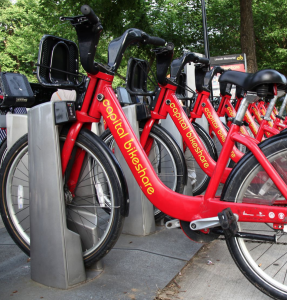 “Drivers, check your rearview mirrors: More and more cyclists are taking to the roads, and they’re not going away anytime soon.”
“Drivers, check your rearview mirrors: More and more cyclists are taking to the roads, and they’re not going away anytime soon.”
So begins the final chapter of Deloitte’s recently released Technology, Media & Telecommunications Predictions 2020 report. Deloitte goes on to predict that around the world tens of billions of additional bicycle trips per year will take place in 2022 over 2019 levels. In total, they predict a 1 percentage point rise in the proportion of people who bike to work during the three years from 2019 to 2022, which in America would mean twice as many riders by 2022. As important the reports highlights bicycling as a technological solution to many modern urban ills through reductions in traffic and pollution, less-crowded public transit systems, and improvements in public health.
The report’s unusual inclusion of bicycling in an annual report dedicated to technology, media, and telecommunications is welcome recognition of the importance of bicycling. Based on our experience, we have no doubt that improving technology will provide better data analytics to support urban planning as well as new apps that help people integrate bicycling into their commutes. More important, these and other technologies, such as e-bikes and improved battery recharging times, will support policies and programs that promote bicycling.
We would just add that bicycling’s impact will only increase as planners and businesses make it a more attractive transportation option for first-mile, last-mile, and overall travel. And an important non-technology step in this process, which Deloitte acknowledged, was the building of the cycling infrastructure critical to making bicycling safer, faster, and even more convenient.
The Deloitte report also features the obvious point that technology alone is not sufficient. As FABB has long advocated, real changes will require getting many sectors–government, business, and especially public health–involved in cycling. The report notes that a major study that followed 236,450 participants for five years found that bicycling to work was associated with a 41 percent lower risk of dying compared with commuting by car or public transport. Cyclists also had a 52 percent lower risk of succumbing to heart disease than noncyclists, and a 40 percent lower chance of dying from cancer. Even riding an electric bike can improve a person’s health; one US study found that people who rode e-bikes for 40 minutes each week for a month improved in cardiovascular health, aerobic capacity, and blood sugar control, while also losing body fat.
 The report also praises bikesharing companies for increasing ridership by bringing bikes to where riders are and where demand exists. More than 1,000 dock-based bikesharing programs exist worldwide, representing tens of millions of shareable bikes. Bikesharing usage is still relatively low in the United States where only 45 million trips were made on shared bikes in 2018 as opposed to the 115 million cars and trucks driven on US streets every day. The electrification of bikeshare docks and bikes, however, should make bikesharing more appealing in the future. Capital Bikeshare currently has removed its e-bikes from service to address safety issues with braking but expects to return them to service.
The report also praises bikesharing companies for increasing ridership by bringing bikes to where riders are and where demand exists. More than 1,000 dock-based bikesharing programs exist worldwide, representing tens of millions of shareable bikes. Bikesharing usage is still relatively low in the United States where only 45 million trips were made on shared bikes in 2018 as opposed to the 115 million cars and trucks driven on US streets every day. The electrification of bikeshare docks and bikes, however, should make bikesharing more appealing in the future. Capital Bikeshare currently has removed its e-bikes from service to address safety issues with braking but expects to return them to service.
Deloitte recognizes that cars are likely to remain prevalent for decades to come but suggests that cities will increasingly reallocate space to accommodate other forms of transport, including bicycles. The report notes that there is plenty of space to reallocate because the United States has more than a billion parking spaces and more than half of all of the country’s downtown space is given over to roads or parking. We would just add that suburban areas around Fairfax County also have space to complete trail networks and link communities with paths that reduce the need to use cars for short trips for shopping and errands.
The report did not examine the role of advocacy groups such as FABB in helping to involve and integrate the work of the public and private sectors in bicycling. But, experience shows that the speed of multimodal transportation improvements will depend on public interest and support. FABB is dedicated to working with its allies to make sure local government and businesses take full advantage of available technology to fulfill the promise of safer and more accessible bicycling. We hope you will join us in 2020.
